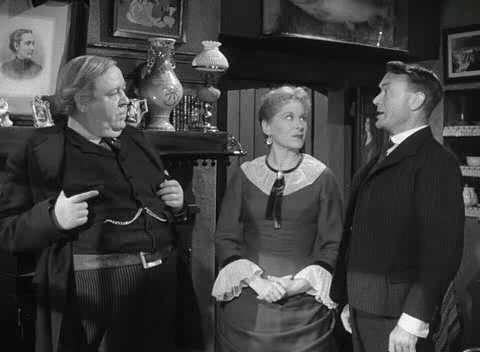This is a surprising film–a matter-of-fact and dry comedy about a woman working to define her own life in a time and situation that were strenuously against that smuggled inside a more typical comedy about a blustery, hard-nosed-but-foolish father and business owner (Charles Laughton). Laughton gives a strong performance that is equal parts physical comedy–the scene of him drunkenly gearing himself up for a run up the stairs is gold–and obstreperous threat. But he’s not the titular Hobson, ultimately. The name and choice belong more to his eldest daughter, Maggie (Brenda De Banzie).
Maggie is straightforward and no-nonsense and widely considered, at thirty, to be past her prime. She strong-arms her sisters’ would-be beaux into buying boots when they’ve really only come to the family shop to do a little under-the-table flirting. She’s the one an elderly wealthy patron appeals to for good sense. And while at first she seems willing to infinitely, if witheringly, manage her father’s bouts of heavy drinking and her sisters’ love affairs, her expectations change when Hobson announces that he’s grown tired of being hemmed in by women and is going to marry the younger two off. Not her, though. She’s too old and he needs her too much. Maggie isn’t having it. Not only is she not too old, she thinks, but she doesn’t want to spend her life fulfilling the needs of someone who can’t give her anything in return.
Yet instead of embarking upon some tentative inner voyage of self-discovery, Maggie acts, quickly and decisively moving to get what she’s already decided she wants. She authoritatively declares herself engaged to the talented, meek Will Mossop (John Mills), who makes the best boots in the shop. It’s a violation of effectively everything: gender norms, class norms, and the norms of basic social niceties, considering Will’s early protests and even his preexisting engagement to another woman. But Maggie steamrolls through the objections, ignoring the ones she can and boldly confronting the ones she can’t, and when she finally shows a real moment of vulnerability with Will, it’s startling… but it isn’t what makes him fall in love with her. No, he’s done that already. Her strength, not her weakness, has captivated him.
Maggie autocratically controls the people around her, but unlike her father, she does it mostly in ways that they themselves find rewarding. Her sisters may have to reluctantly accept a working-class man as their brother-in-law, but Maggie’s orchestrations give them their own husbands and their dowries besides. Will may be surprised to find himself suddenly saddled with a fiancee he never asked for, but Maggie’s belief in him gradually builds up his belief in himself, making him more confident and decisive. When Maggie ultimately comes up against her father in one more confrontation, she gets what she wants, but still leaves him enough dignity that he can survive the loss of a little pride.
It’s an interesting, funny, thoughtful film about class, women, and Charles Laughton falling into corn cellars. But it’s at its most intriguing as a study of what power is and how it gets used and executed. Maggie and Al Swearengen would get along just fine.


